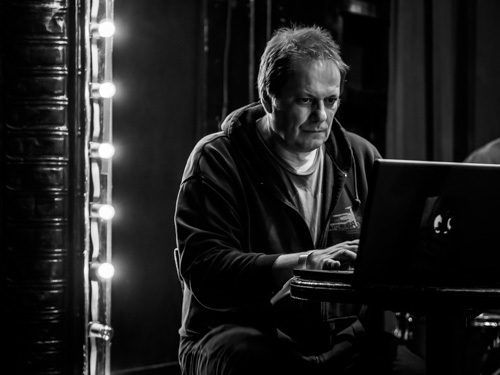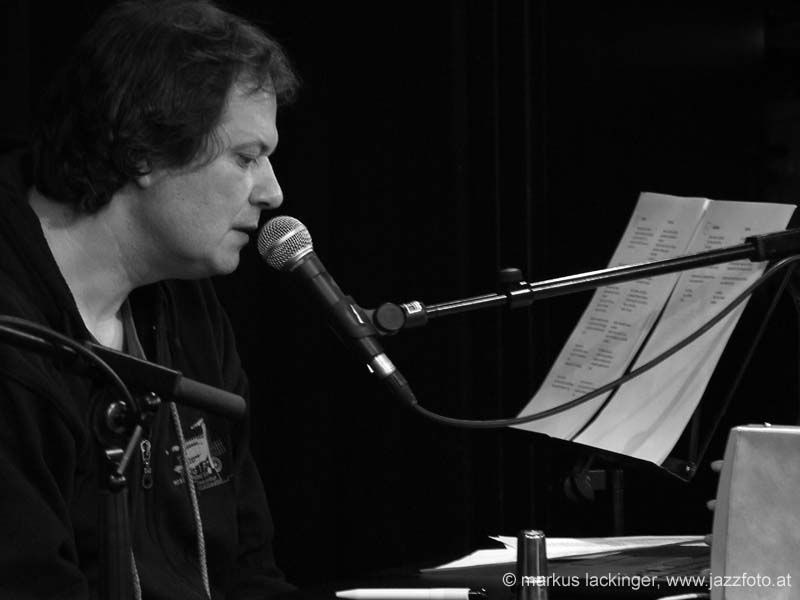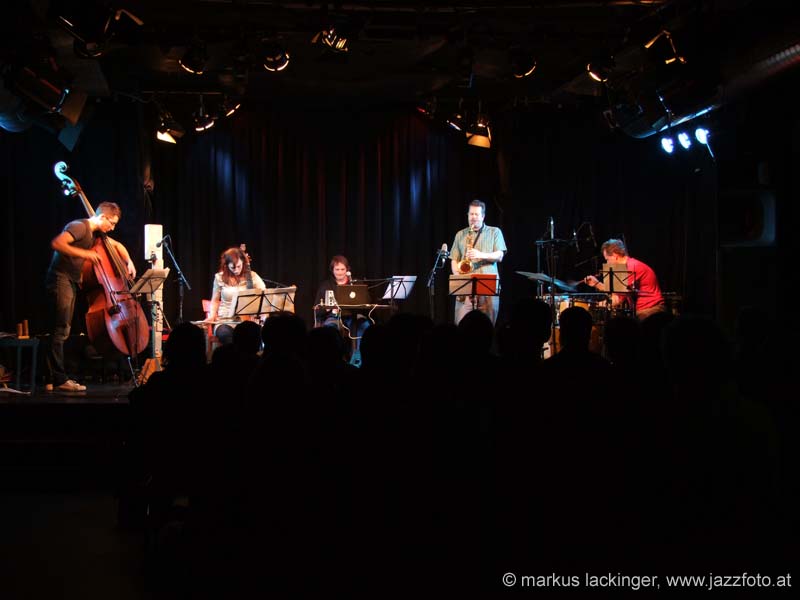Christof Kurzmann is an experienced Austrian musician. He played clarinet and saxopone, but now he is focused mainly on electronics and poetry. Christof has lived in Vienna, Berlin and Buenos Aires and played with John Butcher, Jim O’Rourke, Fennesz, Tony Buck, Burkhard Stangl and many other musicians in all parts of the world. His current collaborative projects are The „Magic I.D.“, „Made to Break“, „El Infierno Musical, „GIS Orchestra“ and a duo with Ken Vandermark. He ran an independent music label „charhizma records“ and was a curator of „Music Unlimited 29“ Festival in Wels in November, 2015.

When you first were interested in listening to music?
Actually I started to become interested in music in very young age, lets say five or six years old. My parents were lot into music and they gave me the feeling that that music is something important and they taught me also that music is the tool of revolution. They played all like from Bedřich Smetana to Louis Armstrong and from Beethoven to Duke Ellington.
And what was your first impressive concert experience as a listener?
I do not remember the first one, but I’ll tell about two very early ones.
One was Don Pullen Quartet with Chico Freeman and, I guess, Fred Hopkins and drummer, I don’t know, maybe Bobby Battle. I was very young and it was in Vienna and was in big room, a thousand people hall. And the guy who made it was famous to tam up the strangest combinations. They played double bill with Public Enemy. Jimmy Hendrix played with Sunny Murray.
And the other concert was a more impact. It was was the duo of Han Bennink and Derek Bailey in London. I haven’t heard such music before. I didn’t understand anything except Bennink’s jokes. I had no idea what did they do and why people like this. But that time I got interested, I wanted to know, why people like it. This concert clearly started my interest in European free jazz thing.
How old were you?
I think I was fourteen.
You have been curated „Music Unlimited 29“. The festival was dedicated to Ornette Coleman. What does his music mean personally to you?
A lot. I was always following him since I was very young. When I first saw his electric band I also could not follow it because it was something that I absolutely did not expect. But it was a complete change in parameters that I took come up with this prime time concept. And then I saw him twelve years ago in Ljubljana with the quartet of Greg Cohen, Tony Falanga and Denardo, I was completely surprised by the fact how the music worked. It was incredible how it had changed everything again. Besides the incedible music I always respected his being strong for years basically not playing, because, like he said: „If the organizers do not pay me what I worth, I’d rather do not play“. That is a very cosequent act and it’s very admirable constancy.
When you’re listening to the music, do you imagine something real: stories or landscapes or something else? Or does music always remain abstract and independent from reality?
Basically it’s more like an act of architecture that satisfies me. When music is build up or shifted in certain way, it awokes my intelligence, asks my brain to cope with it — then I like it a lot. But sometimes it can also be just like saying something and suddenly have a good feeling. Its not like clouds or sea, or train, not that concrete, but it can be a certain feeling of warmth. Of course, music with words tells me stories, but if we talk about music without words — it’s more like how it’s constructed. And if somebody in improvisation picks up something suddenly, comes in with something surprising, but beautiful (or whatever parameter it can be), then it’s kind of closie to my brain.
Do you mean geometrical abstraction architecture?
No, I mean the architecture in a way how the music is build. I do not mean abstraction in that way, it’s only about how something is build up.
Is music still surprising to you?
Yes, sometimes. I mean, of course less and less, but sometimes it happens and it’s also not the only thing I ask for. It’s like I do not believe in new. A month ago I saw Braxton playing with two harpists and a tuba — that was new, of course, I never saw two harpists and a tubist playing with Braxton, but I mean it was not completely new. I do not ask for new. Surprising is good and intelligent is good.
What are your most impressive recent music experiences?
What impresses me at the moment? Ah, all kinds of music. I listen a lot of latin american music, like cumbia, for example. It can be very satisfying to listen to that, it could be a fantastic big band arrangement, it could be a Braxton piece and it could be a beautiful rock song, a lot of other things. I still keep listening to all kinds of music. And I think all kinds of music are good. Every music has 5% good and 95% trash, and this is as much for electronic music as for jazz and for rock. Maybe except operetta, which would be 100% trash, OK, 99%.
Do you listen to recorded music as well?
I used to a lot and now I do less and less, but when I do it I enjoy it a lot. But earlier I heard three records a day, always listened to the music at home, and today its more the contrary: I don’t listen to the music as a background, so when I listen to something I try to dedicate myself to it. The only thing I always do is to check out quickly on the internet when I read something about somebody I don’t know, what could that be? When I just listen to that just to get my own impression.
Do you listen to your own records after their release?
No. Unfortunately before you release a record you have to listen to it a hundred times, so after you release it you never listen to it. At least for a few years, lets say five to ten years. And maybe then you listen it just because you play it to somebody. But I never come to the shelf with my own records and listen to one of them by myself.
Austria has a very rich musical history. Mozart, Haydn, Ludwig van Beethoven, The Strauss family, Mahler, The Second Viennese School.. How important is Austrian classical music for your own composing and understanding music?
This concept would be to nacionalist in a way. I mean I wouldn’t make a distinction between Mozart was Austrian or Beethoven was Austrian or Chaikovsky was Austrian. These things infect me because I grew up with this and it’s my capture, of course, its my background. I enjoy some of it, as I said, 5% of it is really great. But it’s not especially Austrians. Because they did not live when I grew up, so maybe some Austrian jazz musicians inspired me more than Mozart who was dead already.
Maybe not exactly Austrian, but classical composers..
Classical music is something that you have all around at least if you’re not from very low-low-low class, but basically you hear classical music, you enjoy it also, so it conquers your brains and when you do something in music, the whole notation system is build in our European scale, and that’s different from, for example, Arab music or African music, so that’s my musical background. But I have to say that at the same time when I grew up I already grew up as a rock-n-roll influence. I mean it was our pop music that was not European anymore.
How does your ideal audience look like?
Beautiful, for sure! People that came to be surprised, to let themself to be surprised. People who are attentive and the best would be people who also give you some kind of feedback, which is always interesting. Not only this was great, this was bad. I mean nobody would say this was bad, unfortunately, and I don’t ask that. Everybody says everytime something, but it’s nice when from time to time somebody comes with the constructive critic, positive or negative.
Are you satisfied with what you created from the very beginning? Or do you work a lot on it until you like it? Your music — is it more an inspiration or an exploration?
I’m a complete diletant in music so I cannot work something out anyway, because I have no technical facilities for that. I have no idea, how to do that. I have a saxophone, I play something on the saxophone — it’s more the idea. And then you have the idea and you think how that idea could be converted into music, but once you have the feeling — ok, this is expressed, then it’s done. I have so many examples of people who work over and over on the piece and where the original idea is buried under the technique or thirty-six-track recording of the same thing. Basically I want to keep my things simple, that’s the idea and if it’s manageable to get the idea from the other side, from the audience side — and I’m done with the piece or with the idea.
You have not many solo records and concerts. Why do you prefer to play in groups, from duos to orchestras?
Of course I can improvise live. But solo for me is the most boring thing I can do. Minor reason is that my only instrument is electronics. But main point is it’s like a monologue and I much more prefer to talk to people. That’s why for me orchestra is not improvised music — it would be a complete mess if 18 people talk at the same time. That has to be organised. But quartet or quintet can still have dialogues within it or trialogues or whatever and that’s much more interesting than sitting on the stage and having a monologue. I like to listen to other people’s monologues, but i don’t like to get my own.

In sixties poetry readings were usual at free jazz performances. But today free jazz and experimental electronics involve poetry very rarely. Even vocal solo music is built on sounds, cries and whispers rather than on words, as we heard at the festival. But you exploit poetry widely, for example, at the opening set of the festival you read a poem and your project „El Infierno Musical“ is build on poetry. What is poetry to you?
When I started to play music I was a rock musician. One of our main goals was to make a statement about things, it was a very political group. And I wanted to say something. So I wrote texts or I took texts from others. But when Iron Curtain came down, I kind of lost my voice, because I didn’t know what I should tell any more. Because of the broken damb of the Iron Curtain. I don’t want to tell I was a fanatic of socialist system, but it was the only system that was still keeping a balance with capitalism. With the fall of that capitalism was... So I didn’t know what to say anymore and I stopped singing for years. But at one moment I thought: words should come back. And I met different music by then, it was not rock anymore and I thought I must bring poetry back even to abstract music. And I thought it’s a very interesting way to recontextualize: I could bring Johnny Cash text to the improvised music piece and it would make Johnny Cash text sing from a different point. Sometimes I write my own lyrics but mostly I bring in other things, recontextualize it in different settings, which is very interesting.
Are you going to continue the El Infierno Musical somehow?
I tried but in a way.. I’m a very lazy musician, not a person who wants to play 300 concerts a year or wants to be always on tour all the time. I hate to ask if i can play, by now people should ask me to play, so I play very little and whenever I tried to organize El Infierno Musical concerts, nobody wanted it. That is very strange, because the record is fantastic and the audience really loved it. But nobody ever asked my to play with it. So I think not.
It’s a pity. For me it’s a very sad news.
For me too.

Once you ran your own label. Do you continue with it?
No. When I started the label, there were only few labels doing such things and today there are millions of labels. So one moment I felt that it is not necessary any more to have this label. Because in the beginning the idea was mostly to present music of Austria — very diverse, but it was like everybody would put out his own CD and then you go to distributors and they say that one CD does not work. So I made ten CDs very quickly and every distributor said — OK, if it’s ten CDs, we can start distibution. So that was basic idea to be stronger for those people. Sometimes I use the name to present the music, for example I make a lot of charhizma concerts presenting people in Buenos Aires, Berlin and even the Wels festival was called charizma music.
Let’s talk about the festival. Was this your first festival or not?
Now, that was not the first. I organized a lot of festivals. It was the first festival I had curated for somebody. But for myself I organized a lot of festivals, from the mid-90’s till today, in Vienna, Berlin and Buenos Aires.
What were your hardest difficulties this time?
The hardest was.. I was surprised by low budget. I thought it must be more because they did an incredible job to bring all these people with this budget. I thought it must be more, but it was not. So there were already some choices not possible. The second difficulty was not to come close to that everybody says: „Ah, he brings all his friends“. And the third.. I mean the thing I really failed but that’s money thing — is to bring people from Latin America, which would have been my obligation because I’m interested in that, I know those people and I know that nobody else cares about that. But for the money to invite three people from there I can invite a whole day of other people playing. From the beginning I said — I do not invite any stars. I do not invite somebody who gets four times money than others. I said — every musician at my festival gets the same fee. And then it’s my festival.
What was the main idea of the festival? Maybe in its inner structure.
For me the idea was to present good music. There were three subideas, but one was failed — bringing musicians from Latin America, which did not happen. The second idea was to bring a lot of soloists to the festival, to make this possible. Soloists on festivals is usually not possible because people like to go to the festival with seventy names and not to the festival with six names. And the third thing was to give space to piano players, who have a really hard life in Austria, and may be everywhere. So I wanted to give them their space.
And there were a lot of singers.
And there were also a lot of singers, yes, and it comes from my interest in singing in general.
A lot of musicians who played in the festival — you played with them before.
It’s true, but it’s not that I invited only my friends. Of course, I played with Tobias Delius once in my life, of course he’s my friend. But I play a lot in the international scene, so many of musicians are my friends, thanks God. So whom would I invite, only the assholes I never talked to? No. So in the way it becomes. But it was not to invite only my good friends. For example, to Ken I said: either you come with DKV or I don’t invite you. I didn’t want to invite him only because he’s my very-very good friend of mine. I said the band I want from you is DKV, if it didn’t happen, I would not invite you to my festival. So it was not only about friendship, it was about certain ideas also.
And are there some musicians you haven’t played before but you want to?
A lot. Of course I would play with big names, lets say Anthony Braxton, Cecil Taylor, I would like to play with Annete Peacock, but even for my festival, for example, I would love to play with Sidsel Edressen, I would love to play with those two women from Italy, „Duo Marinare“.
Did you find your experience of U29 successful?
Yeah! I think it was not a complete fallout. There were some thing that I could have failed completely, for example with group that met in the first time, that didn’t met before, but nothing was really bad, and on the contrary there were some good concerts, some very good concerts. Usually if I go to the festival and there are two or three bad concerts — no problem, if I here a pair of very good concerts.